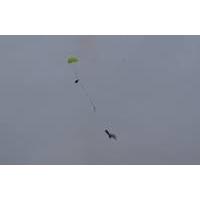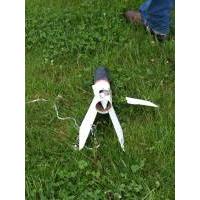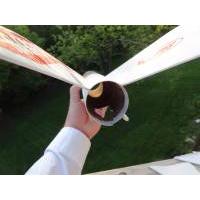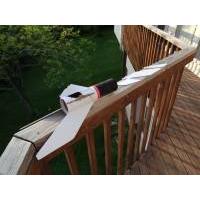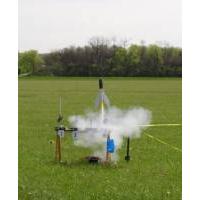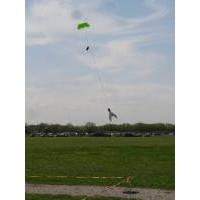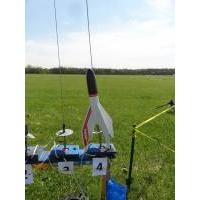| Flight Rating: | starstarstarstarstar |
| Overall Rating: | starstarstarstarstar |
| Published: | 2016-02-02 |
| Manufacturer: | Scratch |
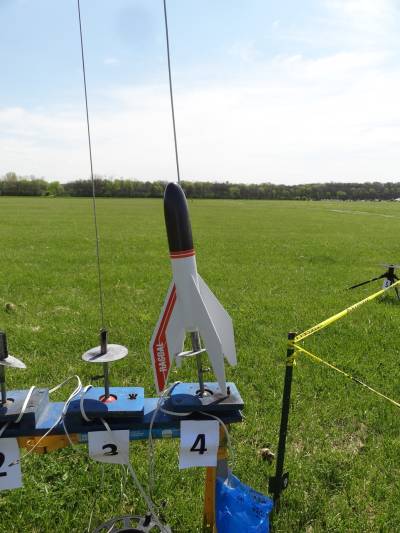 Brief
Brief
I picked up a poorly started attempt at an Estes Rascal via Ebay several years back, then took eight years to finally clone the rocket using the only parts I could salvage, the nose cone and decal sheet. I really liked the finished product, and like all rockets with the Goony profile, I decided that it needed to be upscaled to BT-80 size. I wound up building the upscale twice after the most thorough CATO I'd ever experienced completely destroyed the first attempt. This is the story of both attempts.
Components
- PNC-80BB nose cone
- BT-80 body tube
- 29mm motor mount
- 29mm retainer
- 3/32" balsa fin stock
- 36" Kevlar shock cord
- 36" 1/4" sewing elastic shock cord
- Launch lug
Construction
First of all, the big Rascal is a balsa hog. I was able to get two fins out of each sheet with enough left over to fin a couple more 1:1 clones. So, four sheets for this project. Good thing I like it. The Rascal is a 4fnc rocket, so even upscaled to BT-80 size it's still a simple project.
Finishing
After priming (Valspar primer), sealing (thinned Elmers Carpenter's Wood Filler) and sanding, the project moved on to the painting stage. The first big Rascal was in this stage on the back deck when a breeze came along and blew it off of the grill. It had been stuck in my charcoal chimney and the sound of that hitting the deck was what alerted me to the problem. One fin was shattered, and I tried to repair it, but had to eventually admit defeat and replace it. (Four and a half sheets.) One of my favorite things about the original Rascal was the paint scheme; white body, black nose cone. The decals added some other color, but the basic finishing was a study in simplicity, which is never a bad thing. Valspar gloss white handled the body, while the nose cone was painted with Rustoleum Black Night Metallic.
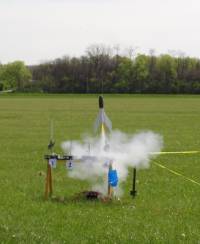
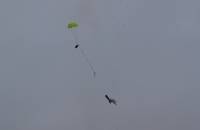
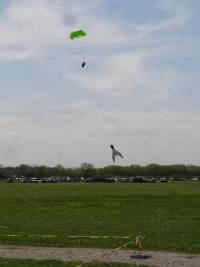
Flight
The first Rascal XL was my leadoff rocket on the most carnage filled day of rocketry I've ever personally experienced back in 2013. I was closing in on 1000 flights and drove 2.5 hours to Muncie, Indiana in the midst of a wicked case of launch fever. Morning had broken ugly at home, misty, breezy and overcast, but for some reason I still felt compelled to make the trip. Muncie added chilly and windy to the misty overcast. It was not a day friendly to rocketry, but I was undeterred. In hindsight I wish I'd been deterred.
I was very proud of the big Rascal, and loaded it with an Estes E9-4 for that first flight. I readied my camera for the liftoff shot, which I kind of got. The real action happened 20 feet later. At about that height the E9 went off like a firecracker. Burning BP shot everywhere. Balsa and cardboard rained down like confetti. The entire flightline, full of happy chatter only seconds earlier, went dead silent, probably waiting to see my reaction. Above the field the remains of the rocket floated slowly down under parachute after being propelled to 100' by the explosion. Balsa and cardboard continued to rain down all around us and the grass smoked in a 15 food circle around the pad. My reaction was threefold. First was "WOW!" Second was "Wonder if I got that on camera?" Third was disappointment, because I could tell by the fluttering balsa and cardboard that the Rascal XL would not be flying any more that day. The flightline moved out into the carnage, picking up the bigger parts and looking for potential hotspots in the damp grass. The carcass landed under chute, quite close to the pads. The damage was inspired. The airframe had been breached at one point between two fins, or more correctly at the spot where the remains of the two fins now stood. All that was left of the motor mount was part of the upper centering ring and the top part of the motor tube and engine block. The motor tube and engine block remnant were charred to the point that touching them caused them to disintegrate and the recovery system pulled free. There had been quite a bit of paper confetti, so it was suggested that the lower centering ring and motor tube had provided much of that. What was left was about six inches of the body tube, one complete fin, one shattered fin, and two stubs. I thought about taking the complete fin, nose cone and recovery system and starting from there, but in the end I just trashed everything but the nose cone, Kevlar and shock cord.
Two years later the replacement was finished and ready to fly, but this time on a 29mm Estes E16-6. I'd also gone with the Estes 29mm motor retainer, just because I happened to have one handy. In fact, the switch to 29mm power was just because I had the parts handy. Launch day this time was a beautiful, bright Saturday in May, almost two years to the day and 180 degrees in conditions from the disastrous first flight. The flight was everything I'd expected, high, straight and relatively slow, with a LONG burn. Like the Enerjet 1340 clone I flew earlier in the day, the big Rascal landed over near the soccer tournament, but unlike the 1340, the Rascal attracted no attention whatsoever.
Three months later I tried it again on an Estes F15-6. Things got freaky pretty fast when the Rascal left the pad on a Little Joe trajectory and flew horizontally across the field. This time I'd used a Mylar chute, which completely stripped away at ejection. The rest of the rocket did a free fall and landed at the far edge of the field, the first of many long recovery excursions I'd make on the day. The rocket survived with a broken fin and a large gash at the top of the body tube, both likely caused by the nose cone rebounding while horizontal. Various theories were put forth as to why the horizontal flight path, but when I recovered the carcass I noticed the missing launch lug, which trumped the "big fin/breezy conditions" theory. It should fly again, but its pretty days are over.
Recovery
Interestingly enough, the same 15" nylon chute handled both flights. I guess you could say I have a "go-to" chute for rockets of this size. The only difference in the recovery was that one had less balsa coming back.
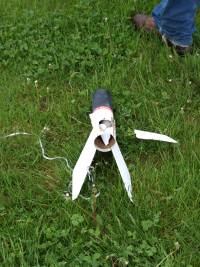
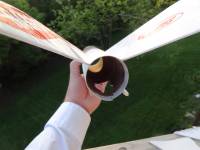
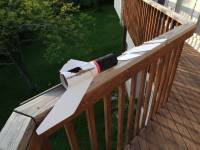
Summary
Pros: Upscale of a seldom seen rocket. Huge fins can handle the mid-size motors. Simple paint scheme.
Cons: Had to build it twice.
Related Products
 |
 |
